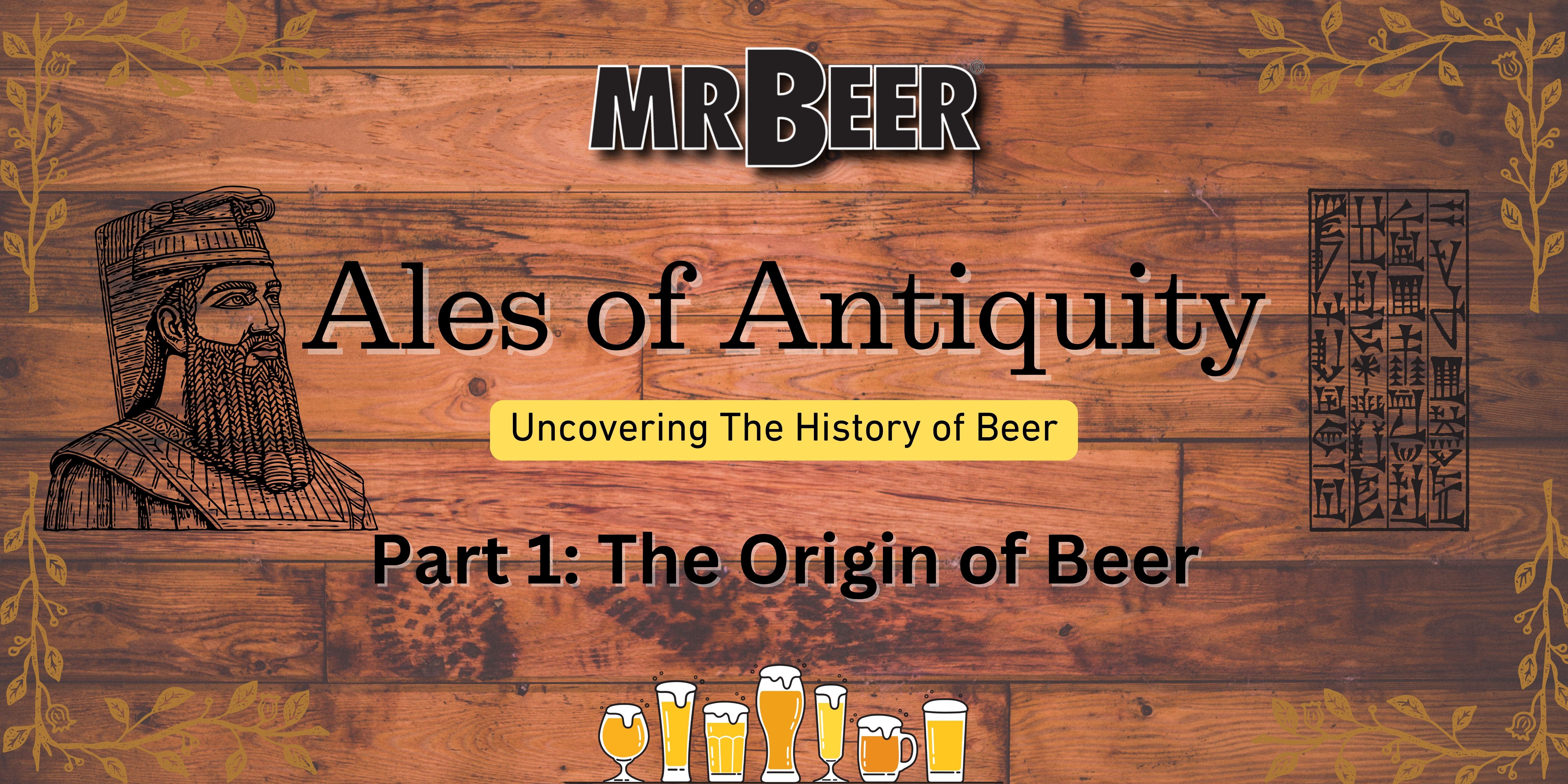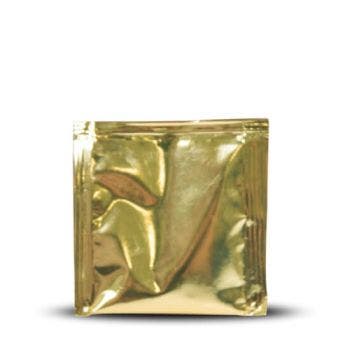Ales of Antiquity: Uncovering the History of Beer - Part 1: Origins

This blog is part of a series exploring the history of beer and it's impact on society, agriculture, and technology. We will examine ancient recipes, techniques, and the people behind them. Each blog post will come with a homebrew recipe for you to try that uses a combination of ingredients from Mr. Beer and/or ingredients you can source elsewhere. We may not stock many of the more unusual items, but some recipes may contain alternative ingredients that are more locally accessible, or can be found on our website (links will be included).
Part 1: The Origin of Beer
China - circa 7000 BCE:
The earliest evidence of fermented beverages, including beer-like drinks, dates back to the Neolithic period, roughly around 9,000 to 10,000 years ago. Archaeological findings suggest that early humans in the Near East and China were producing grain-based fermented drinks around this time. These early beers were likely quite different from modern beers but still represent the beginnings of beer brewing. This period coincides with the advent of agriculture, as humans began to cultivate grains like barley and wheat, which are essential ingredients for brewing beer. The discovery of residues in ancient pottery and other archaeological evidence supports the idea that beer has been a part of human culture for at least 10,000 years.
One of the oldest records comes from Jiahu, a Neolithic village in China, where residues found in pottery jars suggest that around 7,000 BCE, people were brewing a fermented beverage made from rice, honey, and fruit, which is considered an early form of beer. This discovery highlights that the practice of fermentation and brewing was present in ancient Chinese cultures long before it became widespread in the West.
Mesopotamia - circa 5000 BCE:
Even though beer's earliest form may have originated in China, it was the ancient Sumerians of Mesopotamia who stand out as pioneers. Nestled between the Tigris and Euphrates rivers, Mesopotamia, often called the "Cradle of Civilization," was also the cradle of beer.
The earliest evidence of beer in Mesopotamia dates back to around 5,000 BCE. Archaeological discoveries have unearthed ceramic vessels containing beer residues, providing a glimpse into the brewing practices of ancient Sumerians, who inhabited southern Mesopotamia. These early brewers used barley, a staple crop, to craft their beer, which was far different from the clear, crisp brews we enjoy today. Ancient beer was thick, porridge-like, and often consumed with a straw to filter out the solids.
In Mesopotamian society, beer was more than just a beverage; it was a vital part of daily life. It was consumed by people of all social classes, from laborers to royalty. Beer was often safer to drink than water, which could be contaminated, making it a crucial source of hydration. It also provided essential nutrients and calories, serving as a significant part of the diet.
The importance of beer is further illustrated by its role in religious and social rituals. Beer was offered to gods in temples, used in ceremonial feasts, and even as a form of currency for paying workers. The famous "Code of Hammurabi," one of the earliest known legal codes, contains laws regulating the production and sale of beer, underscoring its economic and cultural significance.
The original brewers were women, the priestesses of Ninkasi, and they brewed beer regularly in the home as part of their preparation of meals. Beer was made from bippar (a twice-baked barley bread) which was then fermented. Beer brewing was always associated with baking in the Sumerian culture.
The Hymn of Ninkasi:
One of the most fascinating artifacts from this period is the "Hymn to Ninkasi", dating back to approximately 3,900 BCE. This hymn is not only a praise to Ninkasi, the Sumerian goddess of beer, but also serves as one of the earliest recorded beer recipes. The hymn details the brewing process, which involved soaking and sprouting barley, mashing it into a thick porridge, and fermenting it with wild yeast. This process highlights the ingenuity of the Sumerians in developing fermentation techniques long before modern science understood the principles behind it.
Here is an English translation of the hymn:
Borne of the flowing water,
Tenderly cared for by the Ninhursag,
Borne of the flowing water,
Tenderly cared for by the Ninhursag,
Having founded your town by the sacred lake,
She finished its great walls for you,
Ninkasi, having founded your town by the sacred lake,
She finished its walls for you,
Your father is Enki, Lord Nidimmud,
Your mother is Ninti, the queen of the sacred lake.
Ninkasi, your father is Enki, Lord Nidimmud,
Your mother is Ninti, the queen of the sacred lake.
You are the one who handles the dough [and] with a big shovel,
Mixing in a pit, the bappir with sweet aromatics,
Ninkasi, you are the one who handles the dough [and] with a big shovel,
Mixing in a pit, the bappir with [date] - honey,
You are the one who bakes the bappir in the big oven,
Puts in order the piles of hulled grains,
Ninkasi, you are the one who bakes the bappir in the big oven,
Puts in order the piles of hulled grains,
You are the one who waters the malt set on the ground,
The noble dogs keep away even the potentates,
Ninkasi, you are the one who waters the malt set on the ground,
The noble dogs keep away even the potentates,
You are the one who soaks the malt in a jar,
The waves rise, the waves fall.
Ninkasi, you are the one who soaks the malt in a jar,
The waves rise, the waves fall.
You are the one who spreads the cooked mash on large reed mats,
Coolness overcomes,
Ninkasi, you are the one who spreads the cooked mash on large reed mats,
Coolness overcomes,
You are the one who holds with both hands the great sweet wort,
Brewing [it] with honey [and] wine
(You the sweet wort to the vessel)
Ninkasi, (...)(You the sweet wort to the vessel)
The filtering vat, which makes a pleasant sound,
You place appropriately on a large collector vat.
Ninkasi, the filtering vat, which makes a pleasant sound,
You place appropriately on a large collector vat.
When you pour out the filtered beer of the collector vat,
It is [like] the onrush of Tigris and Euphrates.
Ninkasi, you are the one who pours out the filtered beer of the collector vat,
It is [like] the onrush of Tigris and Euphrates.
(Translation by Miguel Civil, "The Sumerian Hymn to Ninkasi," Journal of the American Oriental Society, Vol. 74, No. 2 (April-June 1954), pp. 121-123.)
The hymn highlights the importance of Ninkasi in the creation of beer and celebrates the role of beer in Sumerian culture. The hymn is not only a historical artifact but also a testament to the significance of beer in ancient Mesopotamia.
The Legacy of Mesopotamia:
The legacy of Mesopotamian brewing extends far beyond the ancient world. Their innovations in fermentation and brewing laid the groundwork for future civilizations. As Mesopotamian culture spread through trade and conquest, so did their brewing techniques. The influence of Mesopotamian beer culture can be seen in the brewing traditions of ancient Egypt and Greece, eventually spreading throughout Europe and the rest of the world.
In conclusion, Mesopotamia's contributions to the world of beer are profound and enduring. From the earliest evidence of brewing to the detailed Hymn to Ninkasi, the ancient Sumerians perfected the art of beer making. Their ingenuity and cultural reverence for beer set the stage for the global appreciation of this beloved beverage. Today, as we enjoy a cold pint, we can raise our glasses in gratitude to the brewers of ancient Mesopotamia, who first discovered the magic of beer.

Mesopotamian Beer Ration Tablet - circa 4000 BCE
Sumerian Ale
"He who does not know beer, does not know what is good." - Ancient Sumerian proverb
Sumerian Ale:
This recipe is loosely based on the one described in the "Hymn to Ninkasi", which was both a prayer and a manual. Brewers would most likely sing this prayer while brewing the beer as a way to remember the steps. We will break down these steps and recreate our recipe from there:
"You are the one who handles the dough...You are the one who bakes the bappir in the big oven"
The 1st step in the hymn mentions "handling the dough" and "bake the bappir". "Bappir" refers to a type of barley-based bread that would have been added to the fermentation. This would have provided some fermentable sugars, starches and dextrins for body, and extra flavor to the beer. Ideally, this should be done with a homemade barley bread for authenticity, but it can also be a store bought bread. I recommend using a whole grain bread that includes barley and/or wheat. Greek barley rusks, which can be found in some grocery stores work great for this.
"You are the one who waters the malt set on the ground"
The 2nd step in the hymn describes the malting process, which is the act of sprouting grains to activate the enzymes required to brew beer (amylase, protease, etc). Fortunately, with today's technology, we can skip this part. Our Mr. Beer Liquid Malt Extracts (LME) and pre-malted grains are already prepared for the fermentation process. You could go the extra step and malt your own grain for authenticity, but this is a long and laborious process that won't really produce any noticeable difference to just using LME or pre-malted grain.
"You are the one who holds with both hands the great sweet wort, Brewing [it] with honey [and] wine"
There are many ways to interpret these lines, especially since the translations can mean many things. The Sumerian translation for "Honey" can mean both honey and date syrup. And while "wine" can mean actual wine, it can also mean grapes or raisins. Some lines were also damaged on the original etched tablet so some context may have been lost or some words may have been mistranslated.
With that said, I will offer a few different options so you can make the final call with your recipe. Regardless of how you do it, it shouldn't be too far off from the original beverage. Just keep in mind when choosing ingredients that there may have been different versions of the drink depending on your status or social class. For example, in lower classes, dates or date syrup/sugar may have been used, while honey (which was more difficult to obtain), may have been reserved for the higher classes.
The wine/raisins/grapes is most likely where the yeast came from to ferment these beers. Of course, due to the fact that no one knew yeast even existed until the late 1600s, they couldn't have intentionally added yeast of their own so it had to have another source. Most beer historians agree that it most likely came from the small amount of wine, grapes, or raisins that are mentioned in the hymn. Again, taking into account that pressed grapes and grape skins are a "waste" product of wine production, this may have been a more accessible ingredient that grapes or wine on their own. Grapes were reserved for wine - not beer, and wine wouldn't have been "wasted" to make a beverage intended for the working class.
So in our recipe, we will be using raisins. They will not be providing the yeast since we will be using a cultured dry yeast for that, but they will provide some tannins, acidity, and a small amount of fermentables that will all contribute to the unique flavor of this ancient beer.
Brewing Notes:
This recipe uses the Mr. Beer little brown keg (lbk). It is a low ABV beer resulting in only around 3% ABV. Remember that this was a daily working class beverage that replaced unpotable water in some cases, so it wasn't very common for beer to have the higher alcohol content we see today. This beer also has no hops since they weren't used in beer until thousands of years after the Hymn to Ninkasi was written.
Due to the low ABV, this will only take 5-7 days to ferment. This is an ancient ale, so clarity of the beer isn't important.
Also, because of the low ABV, this beer has a short shelf-life and should be consumed within 7 days.
If you wish, you can add spices to your beer that may have been accessible in that time period and region. Some traces of cardamom, fennel, coriander, anise, and wild licorice have been found in ancient Sumerian beer vessels, so these could optionally be used to flavor your beer.
Ancient beer, like Sumerian Ale, was not carbonated, though it may have a small amount of fizz if consumed fresh - right after fermentation has completed .
Ingredients:
• 3 - BrewMax LME Softpacks - Pale | Get it Here!
• 1 - Slice of Whole Grain Bread or 1/2 of a Barley Rusk | Source at your local grocery store.
• 2 - 2-Row Brewers Malt | Get it Here!
• 1/2 cup Date Syrup or Honey | Source at your local grocery store.
• 1/4 cup raisins | Source at your local grocery store.
• 1 Pack Dry Ale Yeast | Get it Here!
• 1 - Muslin Sack | Get it Here!
• Spices to Taste (Optional) | Cardamom, fennel, coriander, anise, and wild licorice are a good start. Cinnamon, clove, etc may also be used. Be sure to use the minimal amounts so you don't over do it - just a pinch will do. Source locally.
Instructions:
STEP 1: Sanitizing
1. Fill clean keg with warm water to line mark 1 on the back, then add ½ pack (about 1 tablespoon) of No-Rinse Cleanser and stir until dissolved. Once dissolved, the solution is ready to use. Save the remaining ½ of No-Rinse Cleanser because you will need it for bottling.
2. Screw on lid and swirl the keg so that the cleaning solution makes contact with the entire interior of the keg, including the underside of the lid. Note that the ventilation notches under the lid may leak solution. Allow to sit for at least 2 minutes and swirl again.
3. To clean the spigot, open it fully and allow liquid to flow for 5 seconds and then close.
4. Pour the rest of the solution from the keg into a large bowl. Place your spoon/whisk, can opener and measuring cup into the bowl to keep them cleaned throughout the brewing process. Leave them immersed for at least 2 minutes in cleaning solution prior to using.
5. After all surfaces have been thoroughly cleaned, do not rinse or dry the keg or utensils. Return lid to top of keg, proceed immediately to brewing.
STEP 2: Brewing
1. Add the 2-row malted grains to the muslin sack and tie it off at the end. Set aside.
2. Place BrewMax LMEs in a separate container of warm water to soften. Set aside.
3. Chop up raisins, or at least cut them in half to expose the interior. Set aside.
4. Using a clean measuring cup, pour 6 cups of water into your 4-quart or larger pot. Begin heating the water to a range of 155-160 degrees F and hold it at this range. Next, add the grain sack into the water and maintain the 155-165 temp for 30 minutes, then remove the grains and discard.
5. Bring the grain water to a boil. Once boiling, remove pot from heat and add the BrewMax LMEs to the boiled grain water and stir until dissolved. Also add the raisins at this time.
6. Fill the keg with cold water to line mark 1 on the back. The water must be cold (ideally from the refrigerator) with a temperature of 40-55°F/4-12°C. For the best results, we recommend using bottled spring water or filtered tap water. If using any other fermenter this would be approximately 1 gallon of water.
7. Pour the wort into the keg (raisins included) and then bring the volume of the keg up to line mark 2 by adding more cold water. Mix vigorously with a plastic spoon/ whisk. Be careful to not scratch the inside of the keg, which could create small spaces for bacteria to grow. (If you have a different fermenter top it off with cold water to the 8.5-liter mark). Also add the slice of bread or barley rusk at this time. Tear it into pieces for best results. Be sure it soaks up the wort and there are no dry spots.
8. Sprinkle the entire yeast packet into the keg and then screw on the lid. Do not stir.
9. Allow your fermenter to sit for 5-7 days before bottling.
Store the fermenter in a cool, dark place between 68-78°F/20-26°C for the yeast to work properly. The ideal temperature range is 70-72°F / 21-22°C. After a few days the foam and activity will subside and your batch will appear to be dormant. However, the yeast is still at work, slowly finishing the fermentation process.
STEP 3: Bottling
This beer is uncarbonated so it can be bottled and refrigerated right away. However, if you do wish to have carbonation, you can follow the normal Mr. Beer carbonating instructions found on any of our refills/recipes. Consume within 7 days.
- Brewing Basics & How-To's (203)
- Advanced Home Brewing Techniques (11)
- Seasonal & Specialty Brewing (12)
- Beer Culture & History (119)
- Recipes & Pairings (86)
- Brew School (21)





